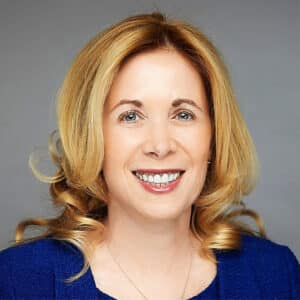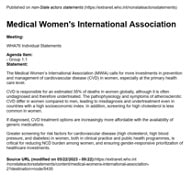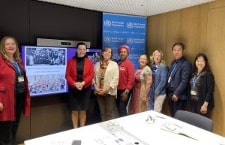Report from Vice President for North America

Connie Newman MWIA Regional Vice President for North America
Greetings from North America!
I had the opportunity to be part of the MWIA delegation to the World Health Assembly 76 (WHA76) that convened in Geneva (May 21-31, 2023). I would like to summarize some highlights, specifically the two statements that were presented, the meeting with the World Health Organization Office of Emergency Preparedness, and the Sex and Gender Roundtable.
MWIA was allowed six delegates, These included members of the Executive Committee: Drs. Eleanor Nwadinobi (President), Mariam Jashi (Secretary General), Amany Asfour (President elect), Eliza Chin (Treasurer), Elizabeth Lichtenstein (VP Northern Europe, and myself. Dr. Padmini Murthy, AMWA Global Health Lead, was also in Geneva, representing AMWA as part of the Women in Global Health and Global Health Council delegation. Dr. Murthy moderated a panel on Gender Equity in the Health Workforce for Health Systems Strengthening. This program was co-hosted by the Government of France, Women in Global Health, in collaboration with the government of Liberia and the Government of Norway.
The MWIA delegation presented two statements at the WHA (see below). One statement, presented at the Committee working on Global Strategy for Women’s, Children’s and Adolescents’ Health (2016-2030), asked WHO to prioritize promotion of Gender Equity and Equality policies and practices in the health sectors and institutions, mainstreaming of Gender-Medicine in undergraduate medical education, and investing in health information and early prevention programs for young populations. MWIA also called for a Global Treaty to end violence against women and girls.
WHA76 Individual Statements
Agenda Item: Item 12. Global Strategy for Women’s, Children’s and Adolescents’ Health (2016-2030)
The Medical Women’s International Association (MWIA) is a non-governmental organization founded in 1919 in New York, registered in Switzerland and representing over 12,000 women physicians in more than 70 countries.
MWIA recognizes the gender-related differences in health and healthcare between women and men, girls and boys throughout the world, and gender inequalities in the medical profession. MWIA is also concerned with the rising incidents of violence against women and girls, and femicide.
To advance the Universal Health Coverage agenda for all, MWIA calls WHO to prioritize promotion of Gender Equity and Equality policies and practices in the health sectors and institutions, mainstreaming of Gender-Medicine in under-graduate medical education, and investing in health education and early prevention programmes for young populations. MWIA also calls for a Global Treaty to end all forms of violence against women and girls.
In the second statement presented during the session on non-communicable diseases, MWIA asked for more investments in prevention and management of cardiovascular disease in women, noting that the pathophysiology and symptoms of atherosclerotic cardiovascular disease differ in women compared to men, leading to undertreatment and misdiagnosis even in countries with a high socioeconomic index. MWIA called for screening of risk factors (cholesterol, blood pressure, diabetes) for cardiovascular disease in women as well as men both in clinical practice and public health programs.
 The MWIA delegation met with Dr. Nedra Emiroglu, Director of WHO Office of Emergency Preparedness. Discussion involved country readiness for health emergencies, such as the COVID crisis, emergency medical teams, vulnerable populations, and community health workers. MWIA will be partnering with WHO Emergency Preparedness to assist with educational materials for Community Health workers. This project will involve National Associations.
The MWIA delegation met with Dr. Nedra Emiroglu, Director of WHO Office of Emergency Preparedness. Discussion involved country readiness for health emergencies, such as the COVID crisis, emergency medical teams, vulnerable populations, and community health workers. MWIA will be partnering with WHO Emergency Preparedness to assist with educational materials for Community Health workers. This project will involve National Associations.

fig 1. MWIA delegates meeting with Dr. Nedra Emiroglu and her staff.
During the last day of the WHA, the Executive Committee members attended the 153rd WHO Executive Session.

